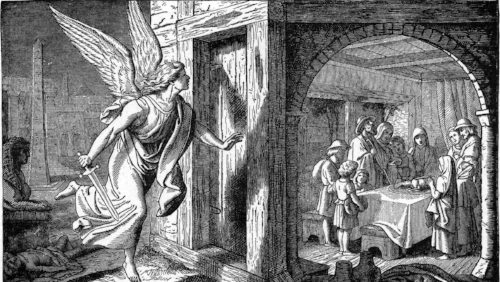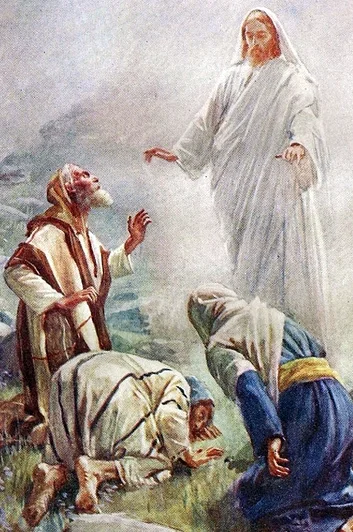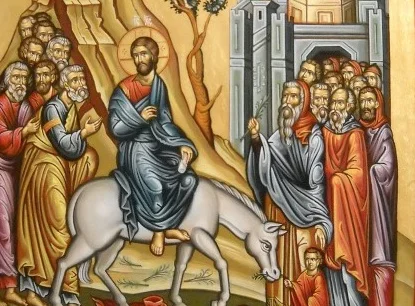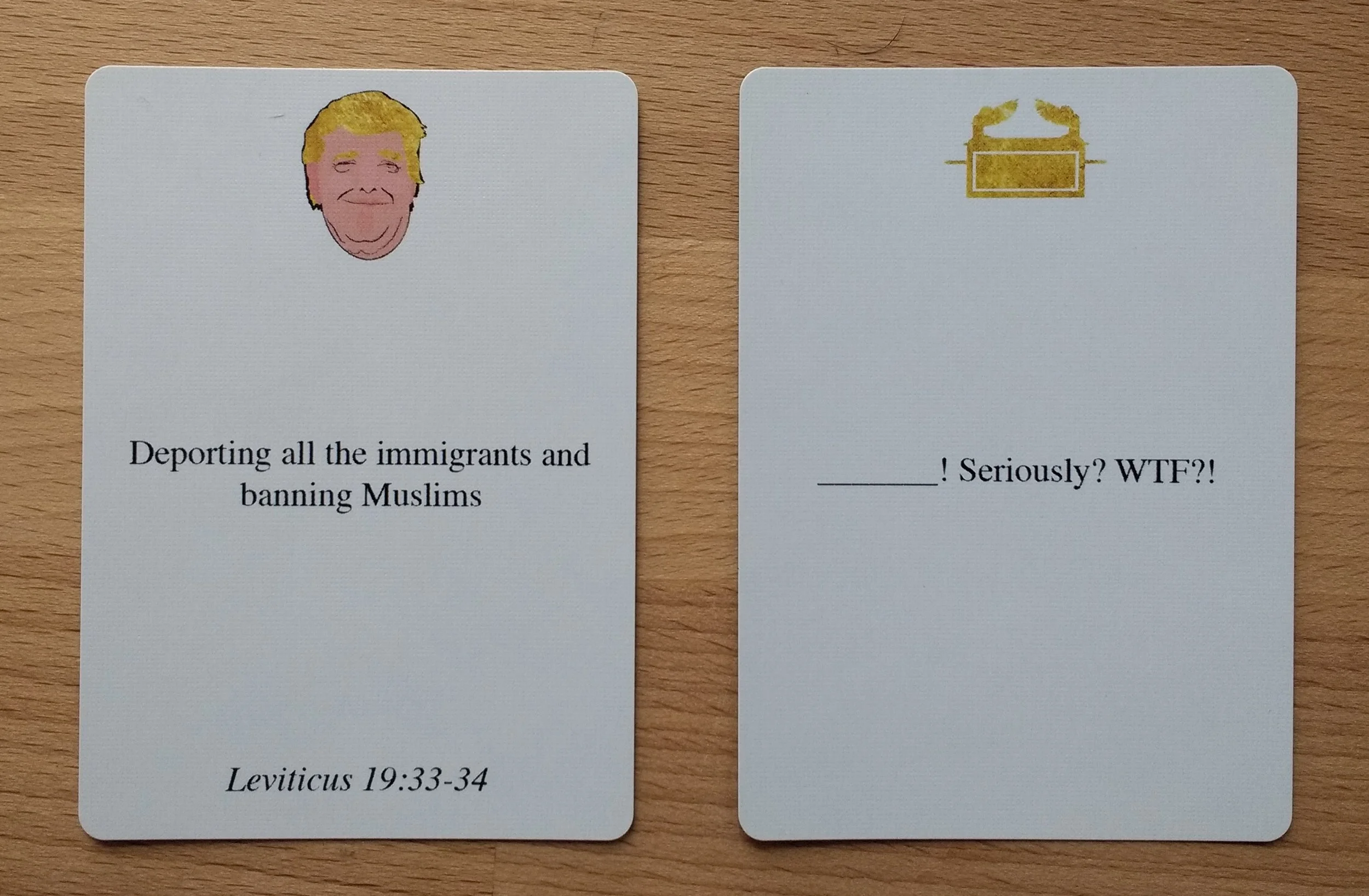. . . one year we’ll defend our belief in an incarnation timed for Sukkoth as there is no way Jesus was born in December, and we’ll write the Card Talk about how the wise men did not show up until He was three years old. Eventually we’ll even address the fact that the little drummer boy was actually a drunk Roman solider looking for his estranged wife (okay, we just made that last one up) . . .
"For Lent I Am Giving Up_______________." [A Card Talk for Lent]
“Deporting all the immigrants and banning Muslims” (Leviticus 19:33-34) OR Why We're Done with Fake News Christians
"For [the election]: LORD hear our prayers." [An Election 2016 Post]
“There really aren’t enough good hymns written about_______” [A Creed Card Talk]
Jesus replied, "Anyone who loves _____ will obey my commands."
“Good Christians regularly raise unspoken prayer requests for__________” A Creed Card Talk/Reflection
Silence reigns as everyone awkwardly stares at the floor, the ceiling, and into the ethereal middle distance between eyes. The clever ones bow heads and pretend to pray. But all are individually thinking about that thing draining their minds of life. That thing they will not share with the rest of the group.
The unspoken prayer request is a staple of protestant youth groups, CCD classes, college Bible studies, and church small groups. They are what remain after the public prayers are heard. They are the shame of our crisis. The sin we pretend is private. The blessing we fear will sound like a brag. The worry we hide. The sum total of all we don’t want others to know about us because we’re afraid of what they will think:
"I don’t want them to know that I struggle with this . . .”
“My problems are not as important as what she just said . . .”
“They’ll know I think about those things . . .”
“They will think that I am just complaining . . .”
“This too will pass. No need to have other people involved . . .”
and besides,
“God knows what’s in my heart, so I don’t have to say it out loud.”
This last is the most Hell worthy, pretending to be holy, bullshit, cop-out we know.
To be clear: There are things you should keep to yourself. Sometimes, in some places, in some contexts, you should keep your God-loving mouth shut. But beyond those times of wise silence who do you trust? Who are you talking to about that-which-shall-not-be-named? If the answer is “no one,” your state of affairs is so much worse than you may have imaged.
The concept of the 3am friend is nothing new: the person you can call at three in the morning and they will be there physically, emotionally, and/or spiritually. The entire legal system in the Hebrew Bible was predicated on relationships within community, in terms of both not doing to others what you would have done to you, as well as the mitzvoth— acts of love and service— done not only for family, superiors, and social equals, but the marginalized and liminal: the poor, the widow, the orphan, the stranger.
We know that two heads are better than one, in work, in love, in laughter, in sadness. When we fall we need someone to lift us up, and God help the person who falls when they are alone. Even better is group of friends, for a threefold cord is not quickly broken (Ecclesiastes 4:9-12).
We know that healing comes through talking about our faults and troubles, and through praying with others (James 5:16); we know that time spent with other of the same mind is how we can push each other to do better in life (Hebrews 10:24-25); and we know that with all the talk about forgiving each other (Matthew 6:12-14, Mark 11:25, Luke 17:3-4, 2 Corinthians 2:10-11, Ephesians 4:32, Colossians 3:13) , know that we are called to love one another (John 13:34).
But to love each other we must allow others to love us. We must love ourselves by allowing other people into our lives. We must accept grace as much, if not more than, we extend it to others.
Perhaps we need to re-examine the value of friendship and community. We can’t go it alone. At least not well and not for long.
But what do we know. We made this game and you probably think we’re going to Hell.
buzzfeed.com
"King Solomon needed so many women because he was over-compensating for _____. "
1 Kings 11:3 records that among Solomon's women were 700 princesses and 300 concubines. A close reading of the Hebrew indicates that this verse is merely recording the number of foreign wives and concubines, not the total number of his women, which means that he had many more wives than this. The focus of the passage is on the women who worshiped gods other than YHWH and Solomon's building of high places and altars to those gods, which begs the question, what happened to Solomon? He was raised to be a good Jewish boy, and good Jewish boys don't marry shiksas, let alone 1000 of them. Seriously. Was the sex that good?
Our two cents: Solomon had mommy and daddy issues.
Read through 1 Kings chapter 1. This part of the "succession narrative" shows that David had no intention of making Solomon king until Bathsheba and Nathan got involved. Taking her cue from the story of Rebekah and Jacob screwing Esau out of his birthright, Bathsheba makes sure her little boy gets the crown by twisting the reality of a frail, old man who can't stay warm even with a beautiful young co-ed wrapped around his body.
Solomon had to live with this knowledge and the fact that his head never quite fully exited Bathsheba's womb; that it was her maternal manipulation that got him the throne, not the divine anointing his father received — attention from on high even Saul was allowed.
Because Solomon's kingdom begins with barely concealed deceit, there were immediate repercussions in the kingdom: an eminent civil war between those who have aligned themselves behind the rightful king (Adonijah, the eldest brother). A war is avoided because Solomon exiles or executes everyone who would stand against him; however, one should not miss that the text records Bathsheba's role in Adonijah's death.
Yes, Solomon built the Temple and centralized worship for the United Monarchy, but he did so on the backs of his people. The Hebrew text describes Solomon's actions in the same ways it does the Pharaoh who stood against Moses and Aaron. Solomon amassed wealth while enslaving his own people, creating Egyptian-like conditions in Israel. And while Solomon built one Temple to YHWH, he built countless more altars to "Astarte the goddess of the Sidonians, and Milcom the abomination of the Ammonites, and "built a high place for Chemosh the abomination of Moab, and for Molech the abomination of the Ammonites ... did the same for all his foreign wives, who offered incense and sacrificed to their gods." (1 Kings 11:4-8) And who physically built those altars? The enslaved people of Israel.
If we believe the sages of tradition, Solomon spent the rest of his life gathering wisdom and wine, whores and wives, vanities upon vanities. In the end his kingdom is divided and his legacy is the punch-line/by-word of the Deuteronomist's warning against kings. (c.f. Deuteronomy 17:14-20)
Perhaps this is part of the reason the book of Ecclesiastes is attributed to him: a book of wisdom and regret after a life ill-spent.
Perhaps he knew of his moral downfall and needed something to keep his mind off of his troubles. Something to keep him warm at night.
Perhaps this is why Solomon needed so many wives and concubines.
Perhaps the king had 99 problems and ...
But what do we know: we made this game and you probably think we're going to hell.
“When your children ask, ‘what do these stones mean,’ you will tell them they represent ____.” OR Why “indoctrination” is not a four letter word
[Creed Card Talk]
Children have inquisitive minds. They ask “why” all the time because they want to learn, they want to understand. Adults assume the responsibility of being answer givers.
“ . . . Those twelve stones, which they had taken out of the Jordan, Joshua set up in Gilgal, saying to the Israelites, “When your children ask their parents in time to come, ‘What do these stones mean?’ then you shall let your children know, ‘Israel crossed over the Jordan here on dry ground.’ For the Lord your God dried up the waters of the Jordan for you until you crossed over, as the Lord your God did to the Red Sea, which he dried up for us until we crossed over, so that all the peoples of the earth may know that the hand of the Lord is mighty, and so that you may fear the Lord your God forever.” (Joshua 4:19b-24)
In the above example the people of Israel are memorializing God’s salvation and provision: bringing them out of the bondage of Egypt, through the Red (Reed) Sea, across the Jordan River. Though many trials would still to come, they had made it that far by the grace of God. And there was much rejoicing. They set up this monument as a physical, tangible, visible reminder of how what their shared experience shaped and defined their identity as a community, while serving as an educational tool for generations to come.
In order for a people, a community, a way of life to continue, for children to have their questions answered, there needs to be more than “religion education” [education about religion(s)]; instead “religious education” is needed. These are very different though the names are only separated by two letters.
RELIGION education is found in many public schools: the obligatory unit or course in “world religions” or “world mythologies” present in many progressive English/Language Arts and Social Studies curriculums. They are non-religious, non-sectarian, non- proselytizing lessons on what various people in various places believe and practice. You are not required to believe or practice those things in order to pass the class: just check the appropriate multiple-choice boxes and fill-in-the-correct-blanks to show that you can intelligently differentiate between The Five Fold Path, the Five Pillars of Islam, and the five books of The Torah without looking like an uncultured philistine at a dinner party, and so you can dominate while playing Jeopardy on an old school NES. There is no “indoctrination” of the students: there is no expectation or requirement for the students to receive the doctrine inside of themselves and accept them as true.
In RELIGIOUS education, members of a community are consciously and purposely “indoctrinating” those under them with the beliefs and practices which define that community. The student not only learns about the beliefs and practices, they are encouraged to actually believe them and authentically practice them: in order to be a part of the community, the student must believe and practice as the community does. (Think: “Sunday School,” “Hebrew School,” CCD, grandma’s not letting you go out to play on Sat morning until she’s imparted her spiritual wisdom for 45mins)
Some people view religious education as indoctrination, and indoctrination as a curse word, a pejorative: that indoctrinating children, or any people, is an oppressive system which robbing individuals of their freedom to think and make up their own minds. Some argue that all people should be given all the options and told to figure it out for themselves, especially children.
Putting aside the obvious issues (e.g. bastardized, non-religious, non- invested summarizes of religions in no way convey their true essence; how capable children are of “making up their own minds” about the existence of God, or picking a religion, with no guidance; etc.), there is nothing inherent in religious education which prevents “free thinking;” Furthermore, religious education, like all ideologies, is about preserving a heritage.
Religious education is the process by which a community says, “this is our shared identity within a community of belief and practice.” To say that this is “wrong” or “evil” is misguided. If a pastor, priest, rabbi, or imam indoctrinates her/his followers to consistently find ways to care for the people in their lives how stupid does the person sound who rails against such “evil indoctrination.”?
[How dare you fill those people’s heads with thoughts of caring for humanity?! Let them (somehow) decide for themselves without any oppressive input from themselves, and against their own (often) selfish and self-centered inclinations to only do good for those who benefit them! Stupid clergy on a power trip! ]
Yeah, shut that fount up.
Indoctrination is not the problem. The problem is never indoctrination. We need indoctrination to identify beliefs and practices of the groups we claim membership. The problem is what we indoctrinate others with: it is the content, not the capacity, which is the problem.
What are the meaning of the stones, the monuments you place in the life of those who come behind you? What are you indoctrinating your physical and spiritual children with? Biblical love and understanding or human intolerance and hate? Easy answers to tough questions or critical thinking which leads to tougher questions?
Perhaps we should spend less time complaining about how other people raise their children, or practice their beliefs, and spend more time examining the stone foundations we place our own children’s feet on.
But what do we know: we made this game, and you probably think we’re going to Hell.



![O Come, O Come Emmanuel (Isaiah 7:14) [An Advent Card Talk]](https://images.squarespace-cdn.com/content/v1/55a9a1e3e4b069b20edab1b0/1483161046976-X5VJE3CMP9T957O72EII/3d-wallpapers-light-dark-wallpaper-35822.jpg)

!["For Lent I Am Giving Up_______________." [A Card Talk for Lent]](https://images.squarespace-cdn.com/content/v1/55a9a1e3e4b069b20edab1b0/1455382743130-8OY85PUM9DW1R2AJIZG4/image-asset.jpeg)

!["For [the election]: LORD hear our prayers." [An Election 2016 Post]](https://images.squarespace-cdn.com/content/v1/55a9a1e3e4b069b20edab1b0/1478569294320-6SBEXSG4XVLDDJL5VJE4/198801_348356691925377_1434895381_n.jpg)



